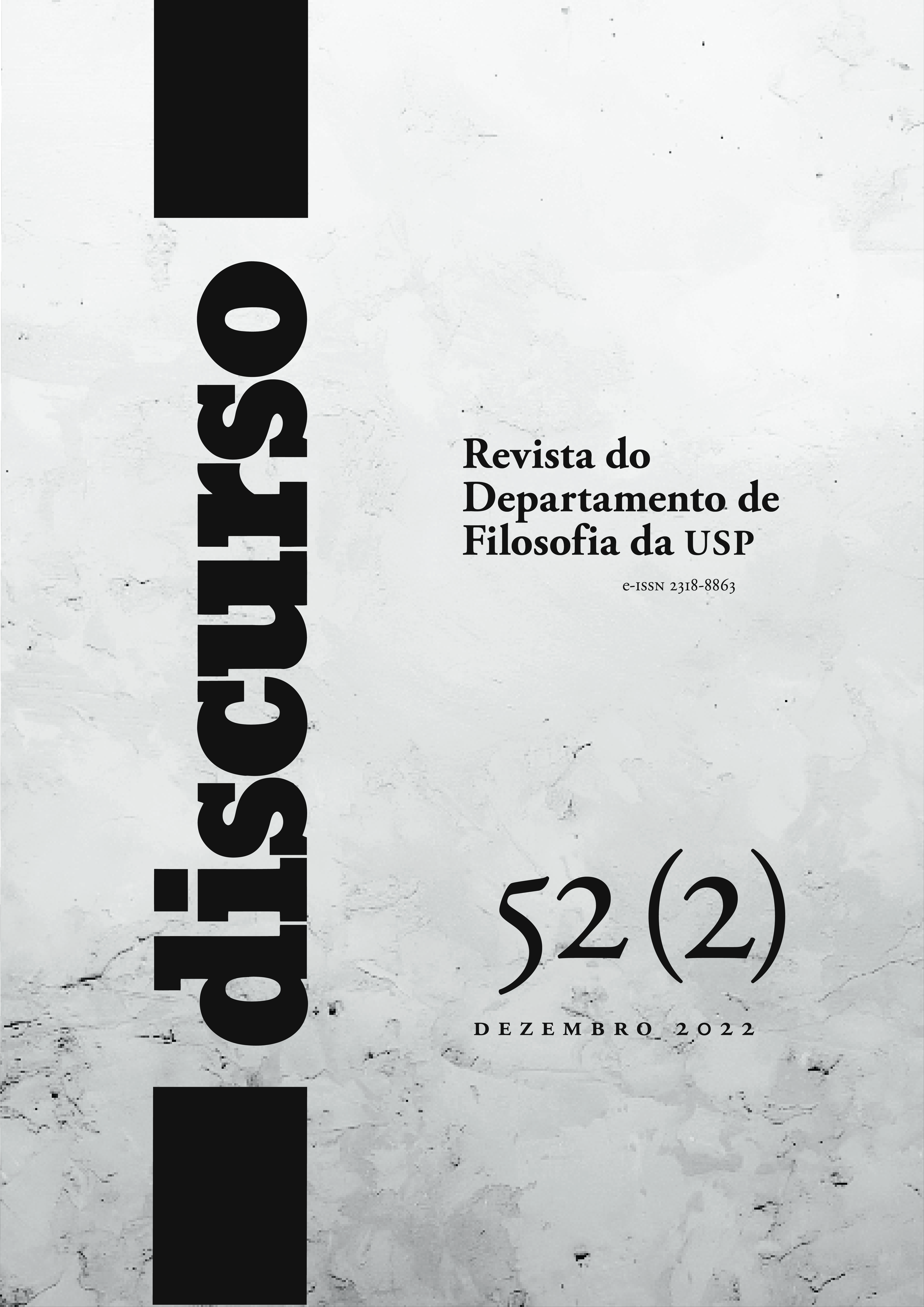O republicanismo e o pensamento político de Hume
DOI:
https://doi.org/10.11606/issn.2318-8863.discurso.2022.206609Keywords:
David Hume’s political thought, british eighteenth-century republicanism, economic power and politicsAbstract
This article inquires Hume’s perceptions about the political and political-economic events of his time. Anchored on J. G. A. Pocock’s analysis, it explores the ways Hume’s political thought could have been affected by the so-called “British eighteenth-century republicanism”, given the context of outspread disquiet with an unprecedented encroachment of economic power into politics. Despite the many contributions that social history and the history of political thought have already made on both the period and the subject, the interpretation of Hume’s perspective still offers some puzzlement, which the article aims to address.Downloads
References
Araujo, C. (2022). “Republicanism and Hume’s Political Thought”. Éthique, poli-tique, religions, nº 20, p.65-90.
Armitage, D. (1997). “Introduction”. In: V. of Bolingbroke. Political Writings. Cambridge: Cambridge University Press.
Brewer, J. (1990). The Sinews of Power: War, Money and the English State (1688-1788). Cambridge: Harvard University Press.
Dickson, P. G. M. (1993). The Financial Revolution in England: A Study on the Development of Public Credit (1688-1756). Londres: Routledge.
Forbes, D. (1975). Hume’s Philosophical Politics. Cambridge: Cambridge University Press.
Goodale, J. R. (1980). “J.G.A. Pocock’s Neo-Harringtonians: A Reconsideration”, History of Political Thought, I(2), p. 237-260.
Heckscher, E. F. (1955). Mercantilism, 2 vols. Londres: George Allen and Unwin.
Hume, D. (1970). Writings on Economics. Ed. Rotwen, E. Madison: The Universi-ty of Wisconsin Press.
Hume, D. (1975). Enquiry concerning the Principles of Morals. In: Enquiries. Oxford: Clarendon Press.
Hume, D. (1978). A Treatise of Human Nature. Oxford: Clarendon Press.
Hume, D. (1983). The History of England: From the Invasion of Julius Cesar to the Revolution in 1688. 6 vols. Indianapolis: Liberty Classics.
Hume, D. (1987). Essays Moral, Political and Literary. Indianapolis: Liberty Fund.
Kramnick, I. (1992). Bolingbroke and his Circle: The Politics of Nostalgia in the Age of Walpole. Cornell: Cornell University Press.
Langford, P. (1997). “The Eighteenth Century (1688-1789)”. In: Morgan, K. (org.) (1997). The Oxford Illustrated History of Britain. Oxford: Oxford University Press.
Morgan, K. (org.) (1997). The Oxford Illustrated History of Britain. Oxford: Oxford University Press.
Pocock, J.G.A. (1971). “Machiavelli, Harrington and English Political Ideologies in the Eighteenth Century”. In: Politics, Language and Time: Essays on Political Thought and History. Chicago: The University of Chicago Press.
Pocock, J.G.A. (1979). “Hume and the American Revolution: the Dying Thoughts of a North Briton”. In: Norton, D. F. et alii (org.). McGill Hume Studies. San Die-go: Austin Hill Press.
Pocock, J.G.A. (1985). Virtue, Commerce, and History: Essays on Political Thought and History. Cambridge: Cambridge University Press.
Robins, C. (1968). The Eighteenth-Century Commonwealthman. Nova York: Athe-neum.
Ross, I. S. (2008). “The emergence of David Hume as a Political Economist: A Biographical Sketch”. In: Wennerlind, C.; Schabas, M. (org.). David Hume’s Political Economy. Abington: Routledge.
Wootton, D. (1993). “David Hume, ‘the historian’”. In: Norton, D. F. (org.). The Cambridge Companion to Hume. Cambridge: Cambridge University Press.
Downloads
Published
Issue
Section
License
Copyright (c) 2022 Cicero Araujo

This work is licensed under a Creative Commons Attribution-NonCommercial-ShareAlike 4.0 International License.
O trabalho da Discurso foi licenciado com uma Licença Creative Commons Attribution-NonCommercial-ShareAlike 4.0 International.
Os autores aqui publicados mantém os direitos sobre seus artigos
De acordo com os termos seguintes:
-
Atribuição [BY] — Deve-se dar o crédito apropriado, prover um link para a licença e indicar se mudanças foram feitas.
-
NãoComercial [NC] — É proibido o uso deste material para fins comerciais.
-
CompartilhaIgual [SA] — Caso haja remixagem, transformação ou criação a partir do material, é necessário distribuir as suas contribuições sob a mesma licença que o original.




